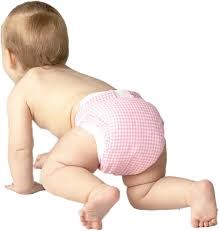 Crawling is the one milestone you do not want your baby to skip. Although to us crawling may seem pretty simple, we often underestimate the effect that this action has on brain and movement development. Crawling is important for the development of muscle strength, balance, coordination, fine motor development, vision, spatial understanding and problem solving, all aspects important for walking later on. Research has also shown that school-going children who have skipped crawling generally struggle more with sports involving the upper limb, ball sports, mathematical concepts and copying work from the blackboard. Crawling can develop any time from 6 to 10 months of age (for premmies, remember to correct their actual age). Your child will not attempt to crawl unless he has mastered stable sitting yet. He may not necessarily crawl in the traditional fashion, but may instead prefer bum shuffling, crawling backwards, leopard crawl, bear walk (on hands and feet) or crab crawl (“upside down”). Do not worry if he is a bit slow to move, or if he prefers to motor himself around in a more non-conventional way. Do seek medical advice, however, if your child uses only the one side of her body to attempt propelling himself forward, or if he makes no effort at all to move his body around purposefully by age 10 months. How can I help my baby master the art of crawling?
0 Comments
Leave a Reply. |
AuthorMarissa Fourie is a physiotherapist in Stellenbosch with a special interest in musculoskeletal conditions, pediatrics, and post/prenatal health. Archives
March 2016
Categories
All
|
||||||

 RSS Feed
RSS Feed